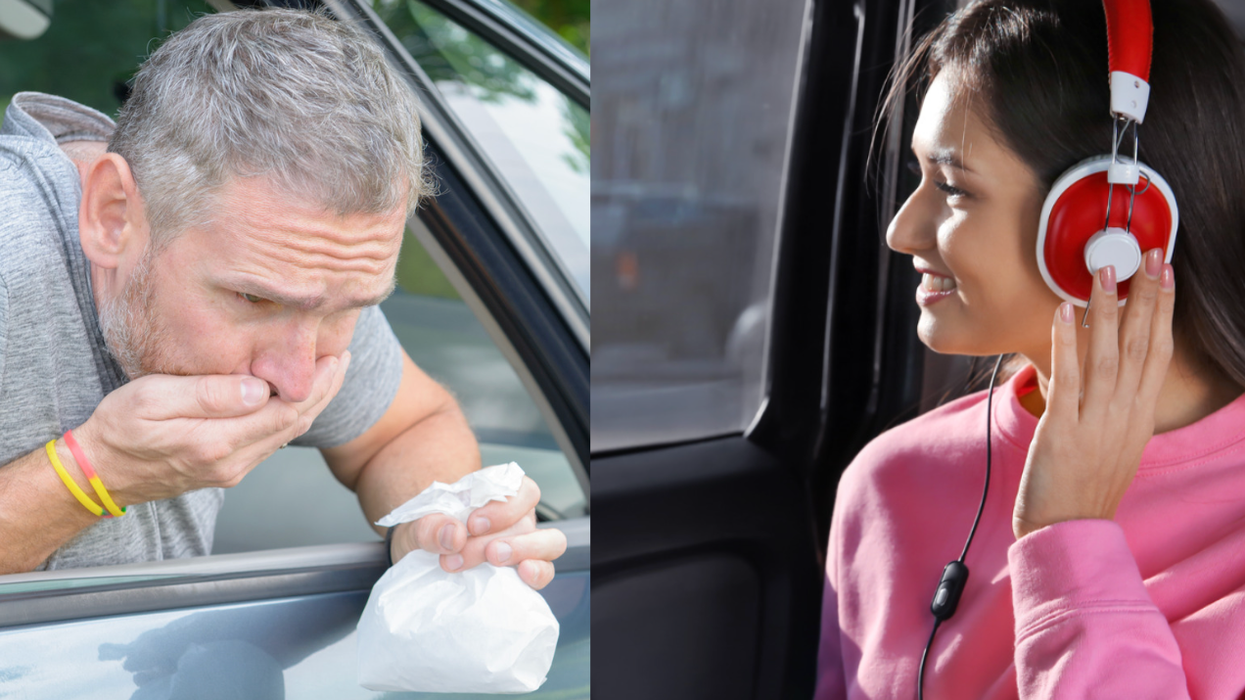Ever felt car sick? If so, you and 46% of car passengers aren’t alone. Car sickness and motion sickness overall can be unpleasant to experience and could lead to unpleasant clean-ups in the car, too. However, a new study found a possible solution to car sickness and its symptoms: putting on your upbeat playlist.
Researchers at Southwest University in China found that listening to certain types of music can help alleviate or cure a person’s car sickness. While musical tastes may vary, they found that specifically joyful, happy music had a 57.6% chance of providing motion sickness relief. This is followed by soft music at 56.7% and passionate music at 48.3% respectively.
@itscourtneymichelle Keeping Dramamine in business since the early aughts #comedy
The scientists recruited 40 participants to screen routes on a driving simulator built to induce car sickness symptoms, screening a group of people who were susceptible to car sickness along with 30 selected participants that reported moderate levels of car sickness in their recent past. By having the participants wear electroencephalogram (EEG) caps during the simulation, the researchers were able to monitor brain activity and identify levels of car sickness in each person. The participants were divided into six groups with four listening to some form of music, one that didn’t listen to music, and one in which the simulation was stopped when the participant first reported car sickness symptoms.
- YouTube youtu.be
Upon looking at the results, it’s theorized that joyful music (such as “Horse Racing” by Huang Haihuai, a song used in the study) distracted the brain and even unlocked “reward systems” to counteract the bad motion sickness feelings. Soft music like “Savour” by the Chinese artist Yao Ying Ge, relieved tension, which typically makes motion sickness worse.
- YouTube youtu.be
“Based on our conclusions, individuals experiencing motion sickness symptoms during travel can listen to cheerful or gentle music to achieve relief,” said Qizong Yue, one of the authors of the study. “The primary theoretical frameworks for motion sickness genesis apply broadly to sickness induced by various vehicles. Therefore, the findings of this study likely extend to motion sickness experienced during air or sea travel.”
Yue also noted that since most medications used to treat motion sickness often have side effects such as drowsiness, listening to the right kind of music could provide “non-invasive, low-cost, and personalized intervention strategy.”
This is far from the first time certain types of music have shown to have a positive impact on physical and mental health. The term “music therapy” is fairly new compared to other forms of medicine, but the concept and practice has existed ever since Ancient Greece. Around the fourth and fifth centuries, flute and harp music was “prescribed” to provide relief from gout among other ailments. Music has been incorporated in various healing rituals and therapeutic procedures in ancient Mesopotamia through the Middle Ages and beyond. In 1896, it was discovered that sound and music could improve blood flow in patients.
@doctorsood Music can act as a natural pain reliever. 🎶 A study found patients who listened to music after surgery had 19% less pain and used half as much morphine. It also helps with labor pain, reducing stress and promoting relaxation. While not a replacement for treatment, music is a simple way to ease discomfort as part of a multimodal treatment plan. Have you used music for pain relief? #medical #health #painrelief #surgery #musictherapy VC: @hashem.alghaili
While music is no longer seen or used as an outright cure for ailments as medicine has advanced, it can still be used effectively for a patient’s treatment plan. There's health research from Harvard and Johns Hopkins University that shows listening to music alleviated pain for arthritic patients, chemotherapy patients, and folks recovering from invasive surgery, thus lessening their reliance on medication for relief. Music therapy has also been shown to positively impact a person’s overall mental health and boost their immune system, too.
This study shows another possible way for music to relieve a person of discomfort or help with overall treatment. While it’s not a replacement for any treatment your doctor prescribes, it might be worth your time to create a recovery playlist and field opinions on which songs to add for the best effects.


















 Volunteers who drive homeless people to shelters talk with a person from Ukraine in Berlin on Jan. 7, 2026.
Volunteers who drive homeless people to shelters talk with a person from Ukraine in Berlin on Jan. 7, 2026.
 Tasks that stretch your brain just beyond its comfort zone, such as knitting and crocheting, can improve cognitive abilities over your lifespan – and doing them in a group setting brings an additional bonus for overall health.
Tasks that stretch your brain just beyond its comfort zone, such as knitting and crocheting, can improve cognitive abilities over your lifespan – and doing them in a group setting brings an additional bonus for overall health. Overdoing any task, whether it be weight training or sitting at the computer for too long, can overtax the muscles as well as the brain.
Overdoing any task, whether it be weight training or sitting at the computer for too long, can overtax the muscles as well as the brain.

 Amoxicillin is a commonly prescribed broad-spectrum antibiotic.
Amoxicillin is a commonly prescribed broad-spectrum antibiotic.  Chart: The Conversation, CC-BY-ND
Chart: The Conversation, CC-BY-ND
 Counterintuitively, social media can make you feel more bored and lonely.
Counterintuitively, social media can make you feel more bored and lonely. Talking about what you’ve read can add a social dimension to what can be a solitary activity.
Talking about what you’ve read can add a social dimension to what can be a solitary activity. 
 Women and people of color who experience cardiac arrest are less likely to receive CPR.
Women and people of color who experience cardiac arrest are less likely to receive CPR.

 Mushrooms containing psilocybin.Photo credit:
Mushrooms containing psilocybin.Photo credit:  Woman undergoing cancer treatments looks out the window.Photo credit:
Woman undergoing cancer treatments looks out the window.Photo credit:  Friend and patient on a walk.Photo credit:
Friend and patient on a walk.Photo credit: